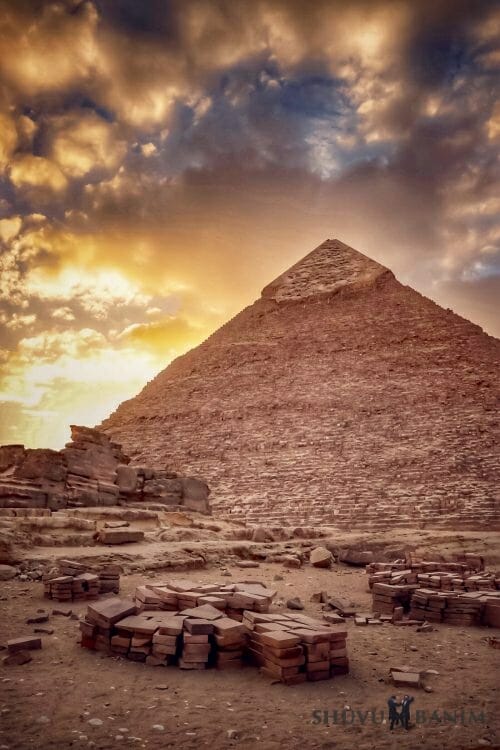The lesson of the Egyptian Man, Parshat Emor
When they distance a person from Above, this needs to be accepted with love
Rashi writes: From Moshe’s courtroom, they would come out guilty.
He came and planted his tent amongst the camp of Dan. They said to him, what’s your reason for being here? He said to them, because I’m from the Tribe of Dan.
They bought the passuk, verse, where it’s written ‘each person according to their own flag’ – according to their father’s house. I.e. each tribe follows the father. The ‘Egyptian Man’[1] went into the courtroom of Moshe and he came out liable, and then he stood up and started blaspheming.
The commentator called the Mei Shiloach says: The fact that they wanted to throw him outside of the camp, this was his tikkun (spiritual rectification). When a person wants to go into his succah and rain starts to fall, this is the same thing. A person wants to go into his succah, but suddenly where his succah is standing, he gets sent a flood. He gets soaked from his head to his feet.
He needs to say:
Ribonu Shel Olam, thank you very much!
I’m not worthy of being a Jew
The Mei Shiloach explains that when a Jew leaves his Succah when it rains, he does so with submission, because he accepts the judgment with love. They throw a jug of water in his face, and he says I’m not worthy of fulfilling the mitzvah of Succah! I’m not worthy of being in the camp of Israel! I’m not worthy of being a Jew at all!
This is similar to what Ruth said, when said [to Boaz] ‘spread your robe over your maidservant’. [She was saying] I’m not worthy of being a Jewess! How can I be a Jew? How can I attach myself to a holy nation?
Jewish souls can accept shame and humiliation
A person whose soul is from the people of Israel, whose soul is from Ruth the Moabitess, which is the soul of King David, this soul can receive all the shame and humiliation in the world; they can throw him out of the Succah and they can throw him out of the camp.
So too, with the Kohanim. They can say to a Kohen you’ve got a blemish, you can’t participate in the Temple services. You have some sort of scratch, some sort of callous, or wart, you can’t perform the service.
Those that have a neshama that comes from the root of Israel, when these people are told to go outside the camp, they accept this with love, and they leave with humility. I believe I can’t properly fulfill the mitzvah of succah…I’m not worthy to perform such a wonderful mitzvah like sitting in the succah…I’m not worthy to sit in the shade of the succah.
But this isn’t the case with the nations of the world.[2]
God is distancing us, no-one else
He, the Jew, knows that Hashem is the one who has distanced him and pushed him away. It’s not Moshe who pushed me away and distanced me, and it’s not because there is protekzia.
And Miriam also knew that it wasn’t Moshe who pushed her away and distanced her. It wasn’t Moshe who was insulting her. Therefore, when he distanced her, she accepted the judgment with love, and therefore, she merited to bring down the well, which was revealed to her, for Am Yisrael.
And this parsha, which talks about the ‘Egyptian Man’, this is something that each and every one of us goes through.
Translated from Aish Moharan, Rav Eliezer Berland’s commentary on the Parsha of the Week
[1] The ‘Egyptian Man’ was a Jew whose mother had had relations with an Egyptian, and he was born of that union. Thus, he had no real ‘tribe’ that he belonged to because while he was still a Jew, which tribe a person belonged to is decided by patrilineal descent.
[2] See the Zohar’s explanation on: ‘Why do they kick the succah?’ When the non-Jews leave the succah [because it is too hot], they leave it appropriately because a person who is suffering from sitting in the succah is exempt from being there. But he explains that the main reason they sat in the succah in the first place is only because they were doing it for their own benefit. Even if they once do a mitzvah, it’s only to show other people that they did it.
Therefore, they kick the succah [on the way out], because they didn’t manage to achieve what they wanted to do. But a Jew, who only wants to do the will of his Master in Heaven, he believes that if Hashem wants it to happen, then great, but if Hashem doesn’t want it to happen, like when a person is suffering and thus is exempt from sitting in the succah, that means that Hashem doesn’t want him to fulfill the mitzvah. So this person agrees to do Hashem’s will, from a place of self-nullification.

















